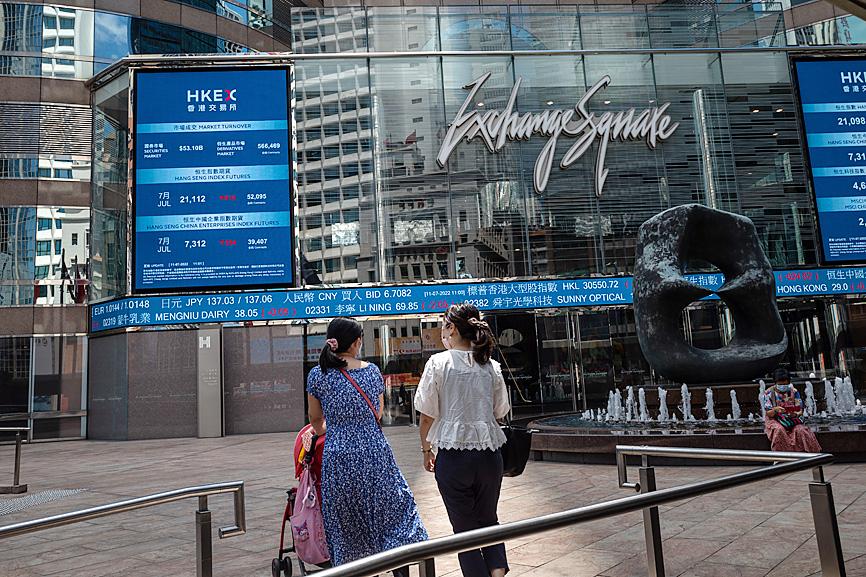Asian shares retreated yesterday, except in Japan, where the benchmark Nikkei 225 index rallied after a landslide parliamentary election victory by the ruling Liberal Democratic Party.
Concerns about global inflation and interruptions to economic activity brought on by the COVID-19 pandemic are adversely affecting investor sentiment in many parts of the region.
However, the tide may be shifting as more and more market players focus on the economic outlook, SPI Asset Management managing partner Stephen Innes said in a commentary.

Photo: EPA-EFE
“A recession is not the market’s base outlook, but until proven otherwise, investors will debate the depth of the growth hit, not the likelihood of recession; thus, good economic data is good news for stocks,” he said.
The Nikkei 225 jumped 1.1 percent to 26,812.30.
Japan’s governing party and its coalition partner scored a major victory in balloting on Sunday, which came two days after the assassination of former Japanese prime minister Shinzo Abe.
The Liberal Democratic Party was bound for victory even before the assassination, but some analysts said the shock of Abe’s death was likely to strengthen that trend.
With its partner Komeito party, the ruling coalition raised its combined share in the 248-seat upper house to 146. Japanese Prime Minister Fumio Kishida almost certainly stands to rule without interruption until a scheduled election in 2025, ensuring that the pro-US defense and diplomatic policies of the late Abe and the Liberal Democrats would continue unchanged.
Australia’s S&P/ASX 200 declined 1.1 percent to 6,602.20. South Korea’s KOSPI lost 0.4 percent to 2,340.27.
Hong Kong’s Hang Seng slipped 3 percent to 21,067.38, while the Shanghai Composite fell 1.2 percent to 3,314.60.
Technology shares fell after market regulators in China fined companies for not reporting past transactions as required.
E-commerce giant Alibaba Group Holding Ltd (阿里巴巴) tumbled 6.8 percent, while Tencent Holdings Ltd (騰訊) lost 3.2 percent.
On Sunday, China’s State Administration for Market Regulation published a list of 28 deals that violated anti-monopoly rules.
It included five of Alibaba’s transactions and 12 of Tencent’s. For violations in each case, the maximum fine was 500,000 yuan (US$74,541).
Alibaba’s shares had risen 70 percent and Tencent’s were up 18 percent since the middle of March, before yesterday’s losses.
“The dip is likely to be temporary. The market was more wary about the US raising interest rates so sharply, but it’s just been overrun by the new fines,’’ said Francis Lun (藺常念), an investment manager and veteran market commentator in Hong Kong.

CAUTIOUS RECOVERY: While the manufacturing sector returned to growth amid the US-China trade truce, firms remain wary as uncertainty clouds the outlook, the CIER said The local manufacturing sector returned to expansion last month, as the official purchasing managers’ index (PMI) rose 2.1 points to 51.0, driven by a temporary easing in US-China trade tensions, the Chung-Hua Institution for Economic Research (CIER, 中華經濟研究院) said yesterday. The PMI gauges the health of the manufacturing industry, with readings above 50 indicating expansion and those below 50 signaling contraction. “Firms are not as pessimistic as they were in April, but they remain far from optimistic,” CIER president Lien Hsien-ming (連賢明) said at a news conference. The full impact of US tariff decisions is unlikely to become clear until later this month

With an approval rating of just two percent, Peruvian President Dina Boluarte might be the world’s most unpopular leader, according to pollsters. Protests greeted her rise to power 29 months ago, and have marked her entire term — joined by assorted scandals, investigations, controversies and a surge in gang violence. The 63-year-old is the target of a dozen probes, including for her alleged failure to declare gifts of luxury jewels and watches, a scandal inevitably dubbed “Rolexgate.” She is also under the microscope for a two-week undeclared absence for nose surgery — which she insists was medical, not cosmetic — and is

GROWING CONCERN: Some senior Trump administration officials opposed the UAE expansion over fears that another TSMC project could jeopardize its US investment Taiwan Semiconductor Manufacturing Co (TSMC, 台積電) is evaluating building an advanced production facility in the United Arab Emirates (UAE) and has discussed the possibility with officials in US President Donald Trump’s administration, people familiar with the matter said, in a potentially major bet on the Middle East that would only come to fruition with Washington’s approval. The company has had multiple meetings in the past few months with US Special Envoy to the Middle East Steve Witkoff and officials from MGX, an influential investment vehicle overseen by the UAE president’s brother, the people said. The conversations are a continuation of talks that

CHIP DUTIES: TSMC said it voiced its concerns to Washington about tariffs, telling the US commerce department that it wants ‘fair treatment’ to protect its competitiveness Taiwan Semiconductor Manufacturing Co (TSMC, 台積電) yesterday reiterated robust business prospects for this year as strong artificial intelligence (AI) chip demand from Nvidia Corp and other customers would absorb the impacts of US tariffs. “The impact of tariffs would be indirect, as the custom tax is the importers’ responsibility, not the exporters,” TSMC chairman and chief executive officer C.C. Wei (魏哲家) said at the chipmaker’s annual shareholders’ meeting in Hsinchu City. TSMC’s business could be affected if people become reluctant to buy electronics due to inflated prices, Wei said. In addition, the chipmaker has voiced its concern to the US Department of Commerce